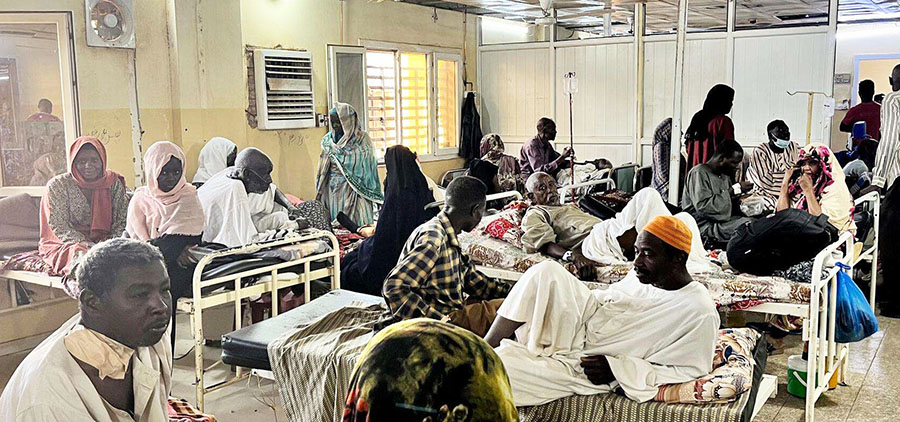
Cholera in times of war: Epidemics challenge Sudans health system
Moatinoon - report
The spread of infectious diseases, particularly cholera, poses a challenge to Sudans health system amid the conflict between the Sudanese Armed Forces and the Rapid Support Forces (RSF) over the past two years.
Sudan will enter the rainy season in July, when the hot and humid environment is conducive to bacterial growth. Mosquitoes, flies, and other vectors thrive, increasing pressure on epidemic prevention and control efforts.
The number of cholera cases in Sudan has exceeded 70,000, with conflict areas experiencing widespread hospital closures and a shortage of medical supplies, hampering the functioning of the infectious disease surveillance, prevention, and control system.
According to the latest data from the United Nations Office for the Coordination of Humanitarian Affairs, between 70% and 80% of medical facilities in conflict areas have closed due to the conflict, and approximately 65% of Sudans population lacks access to basic health services.
Since the cholera outbreak in Sudan in July 2024, the epidemic has spread to 13 of its 18 states, recording approximately 74,000 cases, including more than 1,800 deaths, according to the World Health Organization in mid-June.
Several power plants in Khartoum State have been attacked since May of this year, disrupting water and electricity supplies across large areas of the state. Residents have been forced to drink untreated or unsanitized well or river water, which has exacerbated the spread of cholera in the area.
Dr. Hamad Adel of Bashayer Teaching Hospital said, "Our hospital receives between 20 and 30 cases per day, and sometimes between 60 and 70. The situation changes daily. The hospitals operations are facing significant difficulties, with frequent water and electricity outages. Drinking water for most residents is not sanitized, which is the most serious problem at the moment."
Fath Al-Rahman Mohamed Al-Amin, Director General of the Ministry of Health in Khartoum State, said, "The current epidemic is the result of more than two years of war. The conflict has displaced people, and the lives and property of many have been severely damaged. Medical facilities, equipment, and supplies have also been systematically damaged. The war has caused a serious epidemic."
The Sudanese Ministry of Health launched a cholera vaccination campaign in Khartoum State to curb the epidemic on June 10, targeting approximately 2.6 million people aged one year and older in the state. Currently, the epidemic has been somewhat contained in the state.
In South Darfur State, the Ministry of Health announced on Saturday the registration of new cholera cases, bringing the total number of cases since the beginning of the outbreak to 309. South Darfur State is the state most affected by cholera in the region, which is also experiencing an outbreak in East Darfur and North Darfur, raising concerns about the health situation in the region.
The Health Emergency and Epidemic Control Department of the Ministry of Health in South Darfur reported in an official statement the registration of six new cases of cholera. Of these cases, one was recorded in Nyala locality, while the rest were recorded in Bilil locality. This deteriorating situation reflects the urgent need to strengthen health efforts to combat the spread of the disease.
The Ministry of Health in North Kordofan State revealed that 102 new cholera cases were admitted to the isolation center at El Obeid Hospital on Wednesday, bringing the total number of cases at the center to 259. In its daily report, the ministry reported five deaths, bringing the cumulative number of deaths to 453 and the total number of infections to 5,931.
Last week, the Ministry of Health in Sennar State announced the detection of 153 suspected cases of cholera, including 123 recoveries and nine deaths. Meanwhile, 12 cases remain in isolation centers.
Sudan will enter the rainy season in July, when the hot and humid environment is conducive to bacterial proliferation. Mosquitoes, flies, and other vectors are also thriving, increasing pressure on epidemic prevention and control efforts.

